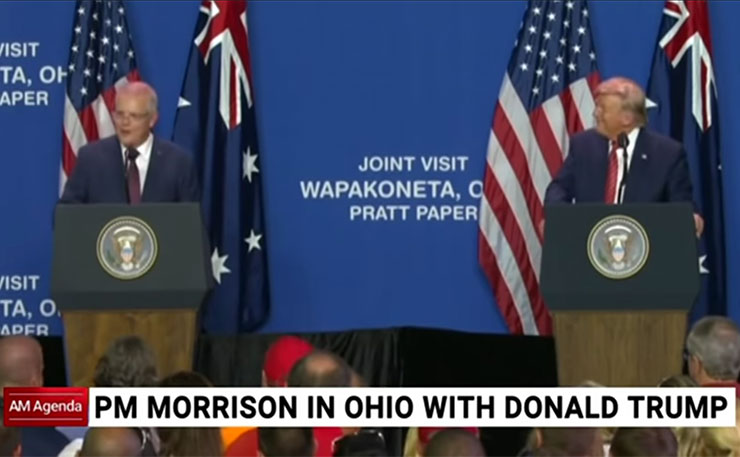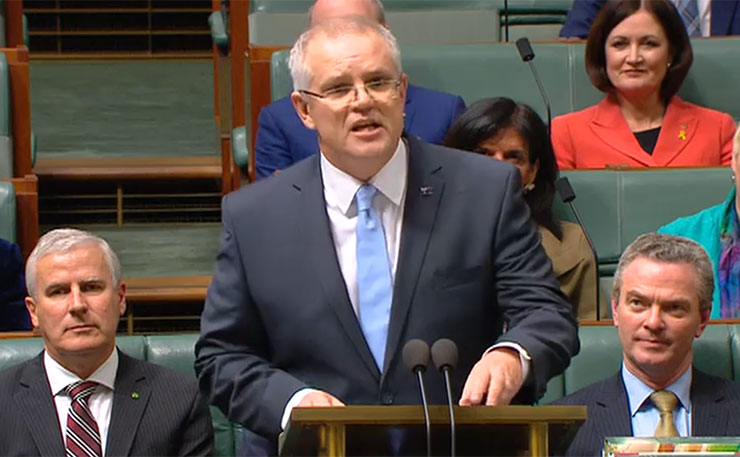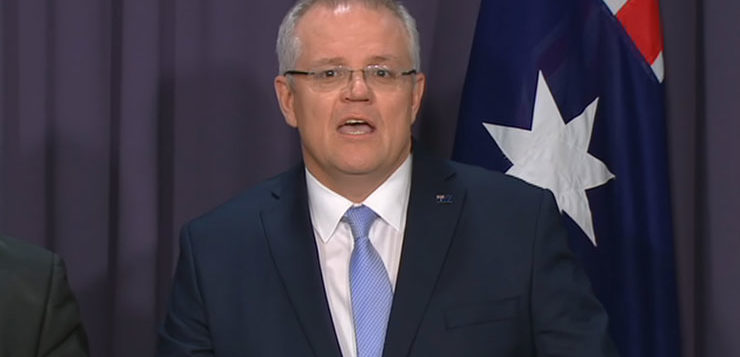DON’T MISS ANYTHING! ONE CLICK TO GET NEW MATILDA DELIVERED DIRECT TO YOUR INBOX, FREE!
There’s many ways to define sovereignty, but our Prime Minister’s way is base and demeaning, writes Emeritus Professor Stuart Rees.
While in Washington last month, the Prime Minister witnessed President Trump speaking about nationalism, patriotism, the treason of traitors and the irrelevance of international treaties. It was his latest flag waving endorsement of American sovereignty as the entitlement to do whatever it likes.
In a more recent Lowy Institute address, Morrison used the same ideas, though he’s been nurturing them for years.
He believes in internationalism when it suits. His notions of sovereignty are displayed in king of the castle rhetoric ‘How good is Australia?’, which means hooray for sovereign borders, ridicule of anyone who questions patriotism, enthusiasm for armed force to repel and punish asylum seekers and veiled support for prosecution and police raids on anyone who would expose government wrong doing.

Morrison spoke in the wake of Trump saying, “The future does not belong to globalists, the future belongs to patriots.” The Prime Minister also decried globalists and in a plagiarised version of John Howard’s infamous Tampa statement about deciding who comes to this country and how, he trumpeted, “We will decide our interests and the circumstances in which we seek to pursue them.”
The Nationalists’ View
Sovereignty as proud nationalism implies disdain for the rights and needs of other peoples and for the planet. It emphasizes one nation going alone irrespective of international obligations.
To echo Trump’s derision of the United Nations, Morrison said there was no higher authority than the people of Australia who elected him. At first this sounds like an unexceptional platitude, but it’s used to rally those who enjoy suspicions being raised about the loyalty of people who don’t think like them and who could therefore be enemies.
The ‘We are great’, ‘We need enemies’ is the dangerous brew on which populists thrive.
This Trump/Brexit/Morrison view of sovereignty pitches ordinary people against an alleged establishment, patriots against supposed globalists.
BE PART OF THE SOLUTION: WE NEED YOUR HELP TO KEEP NEW MATILDA ALIVE. Click here to chip in through Paypal, or you can click here to access our GoFundMe campaign.
In a reference to the UK Conservative party’s war-like language about the EU and towards anyone who opposes Brexit, the London Observer journalist Nick Cohen comments, “The default position of its (Conservative) politicians and journalists is to rouse the rabble by depicting parliament, the judiciary and the civil service as sinister forces conspiring against their country.”
Morrison said he was defending ordinary people against “elite opinion and attitudes which have become disconnected from the mainstream of their societies”.
In Australia at the same time as Morrison’s Lowy speech, the UN High Commissioner for Human Rights, Michelle Bachelet reminded the Prime Minister that Australia had ratified most core international treaties, each of which had been regularly reviewed by human rights bodies.
In response to Morrison’s disdain for treaty obligations unless they suit Australia’s interests, former Australian Ambassador John McCarthy has advised the Prime Minister, “You can’t insist on what you like and reject what you don’t like.”
A nationalist version of sovereignty is outmoded and dangerous. A planet is burning, ice caps are melting and precious species are becoming extinct. The arms industry grows but nuclear disarmament is far distant. A neo-liberal economic system fosters social and economic inequalities and in policy circles, justice to reflect respect for universal human rights is treated as a do-good option which can’t be afforded.
An Inclusive, Cosmopolitan View
Sovereignty could be defined in an inspiring manner, to represent inclusiveness, to encourage humane governance by nation states, support of multilateralism and for an international order.
The visionaries who crafted the UN and the EU knew the benefits of multilateralism and the need for imaginative, respectful dialogue between nations. That was a generous, multi-dimensional view of sovereignty. ‘How dare you think otherwise’, might be the brave Greta Thunberg’s plea.
A cosmopolitan view of sovereignty would produce a vision of the interdependence of peoples and policies and concern for other’s interests. In domestic policies such unselfishness has been dubbed ‘the gift relationship’, which means commitments to strangers without expectation of reward.
In international relations, the gift relationship would cover dialogue across countries to support international treaties and to remind societies and governments of the meaning of civilisation. That suggests a duty of hospitality from which everyone would benefit. It says, whatever you want for yourself, you should be willing to give to others.

There are significant precedents for this way of thinking.
In 2000, political leaders participated in a Millennium Summit to consider the role of the UN at the turn of the 21st century. They concluded, “We recognize that in addition to our separate responsibilities to our individual societies, we have a collective responsibility to uphold principles of human dignity, equality and equity at the global level.”
In his seminal work, Reimagining the Future, former Professor of International Relations at La Trobe University, Joseph Camilleri advocated the promotion of democracy by ensuring much greater equality in people’s access to knowledge and influence.
In articles and books on Humane Governance, the international jurist, political scientist Professor Richard Falk identified the healing qualities of non-violence and of respect for universal human rights.
Before Falk wrote those words, the former playwright and President of Czechoslovakia Vaclav Havel called for the United Nations to become “the platform of joint solidarity-based decision making by the whole of human kind as to how best to organise our stay on this planet”.
Contributions from Poets
This different version of sovereignty stresses enthusiasm for interdependence, a vision which artists, composers and poets described long before alarm about global warming. When crafting his view of sovereignty Scott Morrison missed an opportunity to derive inspiration from artists of any kind. Many poets, for example, speak of civility, tolerance and interdependence, no sign of enemies.
In the 16th century English poet John Donne wrote, “No man is an island entire of itself; every man is a piece of the continent a part of the main….”
In the early 20th century, the Indian philosopher, poet and Nobel Prize recipient Rabindranath Tagore, spoke of “One identity of the universe, a proud harmony of all races”.
When writing thinking about the Human Family, the North American poet Maya Angelou reflected,
I note the obvious differences
between each sort and type
but we are more alike, my friends
than we are unalike’
If it’s difficult for an Australian Prime Minister to use foreign poets to envision a conflict resolving view of sovereignty, he could return to Australian Indigenous poet Oodgeroo Noonucaal. In All One Race, she advised,
‘I’m for human kind not colour
gibes,
I’m international never mind tribes
I’m international, never mind place
I’m for humanity, all one race.’
Oodgeroo’s love and inclusiveness heralded a view of patriotism and globalism so different from the crass, polarising views of Scott Morrison.
BE PART OF THE SOLUTION: WE NEED YOUR HELP TO KEEP NEW MATILDA ALIVE. Click here to chip in through Paypal, or you can click here to access our GoFundMe campaign.
Donate To New Matilda
New Matilda is a small, independent media outlet. We survive through reader contributions, and never losing a lawsuit. If you got something from this article, giving something back helps us to continue speaking truth to power. Every little bit counts.




